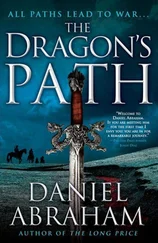Daniel Abraham - An Autumn War
Здесь есть возможность читать онлайн «Daniel Abraham - An Autumn War» весь текст электронной книги совершенно бесплатно (целиком полную версию без сокращений). В некоторых случаях можно слушать аудио, скачать через торрент в формате fb2 и присутствует краткое содержание. Жанр: Фэнтези, на английском языке. Описание произведения, (предисловие) а так же отзывы посетителей доступны на портале библиотеки ЛибКат.
- Название:An Autumn War
- Автор:
- Жанр:
- Год:неизвестен
- ISBN:нет данных
- Рейтинг книги:4 / 5. Голосов: 1
-
Избранное:Добавить в избранное
- Отзывы:
-
Ваша оценка:
- 80
- 1
- 2
- 3
- 4
- 5
An Autumn War: краткое содержание, описание и аннотация
Предлагаем к чтению аннотацию, описание, краткое содержание или предисловие (зависит от того, что написал сам автор книги «An Autumn War»). Если вы не нашли необходимую информацию о книге — напишите в комментариях, мы постараемся отыскать её.
An Autumn War — читать онлайн бесплатно полную книгу (весь текст) целиком
Ниже представлен текст книги, разбитый по страницам. Система сохранения места последней прочитанной страницы, позволяет с удобством читать онлайн бесплатно книгу «An Autumn War», без необходимости каждый раз заново искать на чём Вы остановились. Поставьте закладку, и сможете в любой момент перейти на страницу, на которой закончили чтение.
Интервал:
Закладка:
cities, we gain a few more slaves. Yes, they're the richest cities in
the world. I know it. Sacking even one of the cities of the Khaiem would
put more gold in the High Council's coffers than a season in the
Westlands. But how much do they need to buy Little Ott back from hell?"
Eustin asked. "And why shouldn't I go there and get him myself, sir?"
"It's not about gold. I have enough gold of my own to live well and die
old. Gold's a tool we use-a tool I use-to make men do what must be done."
"And honor?"
"And glory. Tools, all of them. We're men, Eustin. We've no reason to
lie to each other."
lie had the man's attention now. Eustin was looking only at him, and
there was confusion in his eyes-confusion and pain-but the ghosts
weren't inside him now.
"\\'h-,, then, sir? Why are we doing this?"
Balasar sat back. He hadn't said these words before, he had never
explained himself to anyone. Pride again. He was haunted by his pride.
The pride that had made him take this on as his task, the work he owed
to the world because no one else had the stomach for it.
""I'he ruins of the Empire were made," he said. "God didn't write it
that the world should have something like that in it. Men created it.
Men with little gods in their sleeves. And men like that still live. The
cities of the Khaiem each have one, and they look on them like plow
horses. 'Fools to feed their power and their arrogance. If it suited
them, they could turn their andat loose on us. Hold our crops in
permanent winter or sink our lands into the sea or whatever else they
could devise. They could turn the world itself against us the way you or
I might hold a knife. And do you know why they haven't?"
F,ustin blinked, unnerved, Balasar thought, by the anger in his voice.
"No, sir."
"Because they haven't yet chosen to. That's all. They might. Or they
might turn against each other. They could make everything into
wastelands just like those. Acton, Kirinton, Marsh. Every city, every
town. It hasn't happened yet because we've been lucky. But someday, one
of them will grow ambitious or mad. And then all the rest of us are ants
on a battlefield, trampled into the mud. That's what I mean when I say
this is needed. You and I are seeing that it never happens," he said,
and his words made his own blood hot. He was no longer uncertain or
touched by shame. Balasar grinned wide and wolfish. If it was pride,
then let him be proud. No man could do what he intended without it.
"When I've finished, the god-ghosts of the Khaiem will be a story women
tell their babes to scare them at night, and nothing more than that.
That's what Little Ott died for. Not for money or conquest or glory.
"I'm saving the world," Balasar said. "So, now. Say you'd rather drown
than help me."
1
It had rained for a week, the cold gray clouds seeming to drape
themselves between the mountain ranges to the east and west of the city
like a wet canopy. The mornings were foggy, the afternoons chill. With
the snowdrifts of winter almost all melted, the land around hlachi
became a soupy mud whose only virtue was the spring crop of wheat and
snow peas it would bring forth. Travel was harder now even than in the
deadly cold of deep winter.
And still, the travelers came.
"With all respect, this exercise, as you call it, is ill-advised," the
envoy said. His hands still held a pose of deference though the
conversation had long since parted from civility. "I am sure your
intentions are entirely honorable, however it is the place of the I)ai-kvo-"
"If the I)ai-kvo wants to rule hfachi, tell him to come north," the Khai
NIachi snapped. "He can pull my puppet strings from the next room. I'll
make a bed for him."
The envoy's eyes went wide. He was a young man, and hadn't mastered the
art of keeping his mind from showing on his face. Utah, the Khai Machi,
waved away his own words and sighed. He had gone too far, and he knew
it. Another few steps and they'd he pointing at each other and yelling
about which of them wanted to create the 'T'hird Enr pire. The truth was
that he had ruled hlachi these last fourteen years only by necessity.
The prospect of uniting the cities of the Khaiem under his rule was
about as enticing as scraping his skin off with a rock.
The audience was a private one, in a small room lined with richly carved
hlackwood, lit by candles that smelled like rich earth and vanilla, and
set well away from the corridors and open gardens where servants and
members of the utkhaiem might unintentionally overhear them. This wasn't
business he cared to have shared over the dances and dinners of the
court. Otah rose from his chair and walked to the window, forcing his
temper back down. He opened the shutters, and the city stretched out
before him, grand towers of stone stretching up toward the sky, and
beyond them the wide plain to the south, green with the first crops of
the spring. He pressed his frustration back into yoke.
"I didn't mean that," he said. "I know that the Dai-kvo doesn't intend
to dictate to me. Or any of the Khaiem. I appreciate your concern, but
the creation of the guard isn't a threat. It's hardly an army, you know.
A few hundred men trained up to maybe half the level of a Westlands
garrison could hardly topple the world."
"We are concerned for the stability of all the cities," the envoy said.
"When one of the Khaiem begins to study war, it puts all the others on
edge."
"It's hardly studying war to hand a few men knives and remind them which
end's the handle."
"It's more than any of the Khaiem have done in the past hundred years.
And you must see that you haven't made it your policy to ally yourself
with ... well, with anyone."
\Vell, this is going just as poorly as I expected, Otah thought.
"I have a wife, thank you," Otah said, his manner cool. But the envoy
had clearly reached the end of his patience. Hearing him stand, Otah
turned. The young man's face was flushed, his hands folded into the
sleeves of his brown poet's robes.
"And if you were a shopkeeper, having a single woman would be
admirable," the envoy said. "But as the Khai Machi, turning away every
woman who's offered to you is a pattern of insult. I can't be the first
one to point this out. From the time you took the chair, you've isolated
yourself from the rest of the Khaiem, the great houses of the utkhaiem,
the merchant houses. Everyone."
Otah ran through the thousand arguments and responses-the treaties and
trade agreements, the acceptance of servants and slaves, all of the ways
in which he'd tried to bind himself and Machi to the other cities. They
wouldn't convince the envoy or his master, the Dai-kvo. They wanted
blood-his blood flowing in the veins of some boy child whose mother had
come from south or east or west. They wanted to know that the Khai
Yalakeht or Pathai or 'Ian-Sadar might be able to hope for a grandson on
the black chair in Machi once Otah had died. His wife Kiyan was past the
age to bear another child, but men could get children on younger women.
For one of the Khaiem to have only two children, and both by the same
woman-and her a wayhouse keeper from Udun.. They wanted sons from him,
fathered on women who embodied wise political alliances. They wanted to
preserve tradition, and they had two empires and nine generations of the
Khaiate court life to back them. Despair settled on him like a thick
Читать дальшеИнтервал:
Закладка:
Похожие книги на «An Autumn War»
Представляем Вашему вниманию похожие книги на «An Autumn War» списком для выбора. Мы отобрали схожую по названию и смыслу литературу в надежде предоставить читателям больше вариантов отыскать новые, интересные, ещё непрочитанные произведения.
Обсуждение, отзывы о книге «An Autumn War» и просто собственные мнения читателей. Оставьте ваши комментарии, напишите, что Вы думаете о произведении, его смысле или главных героях. Укажите что конкретно понравилось, а что нет, и почему Вы так считаете.









